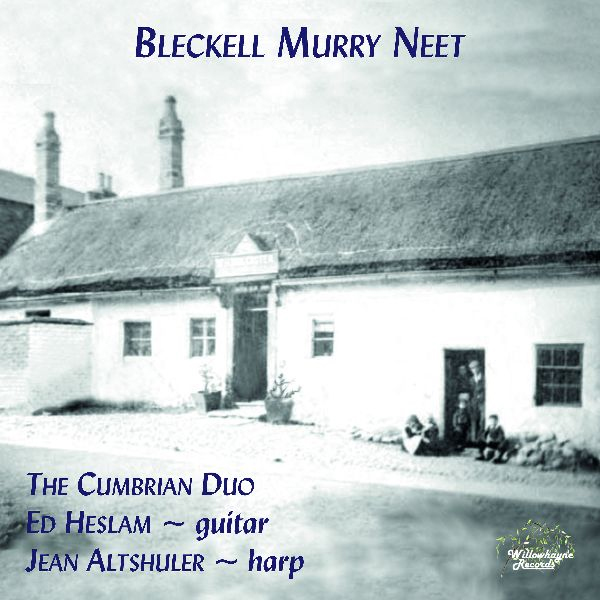Bleckell Murry Neet is a new album of Cumbrian music played on the guitar and harp. Ed Heslam has a background in classical guitar performance, as a soloist and in various ensembles, while Jean Altshuler has developed a career as an orchestral harpist and, more recently, playing the lever harp in chamber music. For this album, Jean has returned to the pedal harp, giving a more resonant sound, which perfectly complements the rich tone of the Carrillo guitar, as well as allowing more scope in arranging the music.
The content represents a snapshot of musical themes that would have been familiar to the people of Cumberland and Westmorland during the late 18th and 19th centuries. Bleckell Murry Neet carries with it the history of a bygone era. It alludes to a time when dialect was widely spoken (and sung) in Cumberland and Westmorland; to a period when everyday people danced with an energy and passion that is now hard to imagine and to an era when the town of Whitehaven was at the center of trade and communications, while central Lakeland was merely an obscure backwater.
The album consists of a series of melodies collected from the manuscripts of Cumbrian musicians. These old tunes carry the hint of stories of love lost, of love yearned for, and of love found; they allude to tales of the Border Reivers and stories of the corruption and electoral fraud of the rich landed gentry who often exerted a malign control over the region and its people.
Bleckell Murry Neet is not an attempt to recreate the sound of the past. The Lakeland fiddle-playing tradition died out at the beginning of the twentieth century and, with the demolition of the White Ox pub (scene of the party mentioned in the title track) in 1904, the ballads of Robert Anderson became a vague and distant memory forgotten to all but a few. The melodies do, however, live on in this album within new musical forms.
Artist Biographies
Ed Heslam is a composer and classical guitarist who worked for many years as Head of Music in several West Country schools, first in Devon then later in Bristol. During this time, he wrote and produced many musicals and composed music for contemporary dance projects. Has was a member of an early music consort and a folk dance band. He made a number of arrangements of traditional folk melodies.
After retiring from teaching, Ed moved back to Cumberland, the county of his birth, where he started researching old local music manuscripts. He found a great deal of fascinating, unpublished material in the tune books of 18th and 19th century fiddle players and a wealth of old songs long forgotten in the county (except by a few aficionados).
Initially, he created arrangements for solo guitar, then guitar/harp duets after teaming up with Jean Altshuler. These first arrangements of old Cumbrian music were an attempt to recreate something similar to the original performance style of the music. Most recently, he has taken the view that the old melodies can be developed into new music and set into a new context. He has arranged many of the songs of Susanna Blamire (1747 – 1794) and Robert Anderson (1770 – 1833) and created new compositions inspired by the Cumbrian landscape and the stories of its people.
Jean Altshuler has been playing the harp since she was seven. She attended Music and Art High School in New York and graduated from Oberlin Conservatory on a harp scholarship. After many years as principal harpist with several American orchestras, she moved to the Lake District where she now lives.
She is a founding member of Harps Northwest and has taught workshops on early music and Eastern European tunes arranged for lever harp. She met classical guitarist Ed Heslam in January 2016 after seeing an anthology of his music beside the unique and extraordinary musical stones at the Keswick museum of local history. Since then she has enjoyed learning and playing Ed’s arrangements of tunes from Cumberland and Westmorland. They have performed at venues throughout the North of England and Scotland.


